名人英文介绍(爱因斯坦
爱因斯坦英文介绍
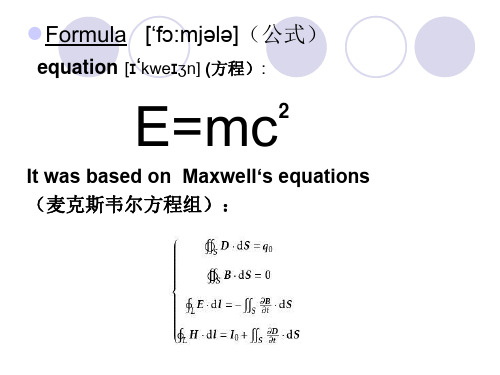
E=mc
2
It was based on Maxwell‘s equations (麦克斯韦尔方程组):
Albert Einstein was the greatest scientist of the 20th century and one of the greatest physicist of all time. His discoveries and theories have greatly influenced science in many fields.
Because Einstein was Jewish, when Hitler (希特勒)took over Germany in 1933, he had to leave the country and finally settled in the
United States .There he continuted his study on the structure [s‘trʌktʃə(r)]结构 of the universe until his death in 1955.
Albert Einstein
/ælbərt aɪnstaɪn/ (1879 1955)
As a boy, he was slow to learn to talk, but later in his childhood he showed great interest about nature and ability to solve difficult mathematical problems. After he left school, he went to Switzerland, where he graduated from the university with a degree in mathmatics.
英语作文三个人物介绍名人

英语作文三个人物介绍名人英文回答:Albert Einstein.Albert Einstein was a German-born theoretical physicist who developed the theory of relativity, one of the two pillars of modern physics. His work is also known for its influence on the philosophy of science.Einstein was born in Ulm, Germany, on March 14, 1879. He showed an early aptitude for mathematics and physics, but he was a poor student in other subjects. After graduating from high school, he enrolled at the Swiss Federal Polytechnic School in Zurich, where he studied physics and mathematics.In 1905, Einstein published four groundbreaking papers on the photoelectric effect, Brownian motion, special relativity, and the equivalence of mass and energy. Thesepapers revolutionized physics and established Einstein as one of the leading physicists of his time.In 1915, Einstein published his general theory of relativity, which extended his special theory of relativity to include gravity. The general theory of relativity is one of the most important and successful theories in physics, and it has had a profound impact on our understanding ofthe universe.Einstein died in Princeton, New Jersey, on April 18, 1955. He is considered one of the most important and influential physicists of all time.Marie Curie.Marie Curie was a Polish and naturalized-Frenchphysicist and chemist who conducted pioneering research on radioactivity. She was the first woman to win a Nobel Prize, the first person and only woman to win the Nobel Prize twice, and the only person to win the Nobel Prize in two different scientific fields.Curie was born in Warsaw, Poland, on November 7, 1867. She showed an early aptitude for science and mathematics, and she went on to study physics and chemistry at the Sorbonne in Paris.In 1895, Curie married Pierre Curie, a fellow physicist. Together, they conducted groundbreaking research on radioactivity. In 1898, they discovered two new elements, polonium and radium.In 1903, Curie, her husband, and Henri Becquerel were awarded the Nobel Prize in Physics for their work on radioactivity. In 1911, Curie was awarded the Nobel Prizein Chemistry for her work on the isolation of radium.Curie died in Passy, France, on July 4, 1934, from aplastic anemia, a disease caused by exposure to radiation. She is considered one of the most important and influential scientists of all time.Stephen Hawking.Stephen Hawking was a British theoretical physicist, cosmologist, and author. He was a leading authority onblack holes and cosmology.Hawking was born in Oxford, England, on January 8, 1942. He showed an early aptitude for mathematics and physics,and he went on to study natural sciences at the Universityof Oxford.In 1963, Hawking was diagnosed with amyotrophic lateral sclerosis (ALS), a progressive neurological disease that eventually paralyzed him. Despite his physical challenges, Hawking continued to conduct groundbreaking research on black holes and cosmology.In 1974, Hawking published his book "A Brief History of Time," which became a bestseller and introduced the general public to the complexities of black holes and cosmology.Hawking died in Cambridge, England, on March 14, 2018. He is considered one of the most important and influentialphysicists of all time.中文回答:阿尔伯特·爱因斯坦。
爱因斯坦英文介绍(共10张PPT)
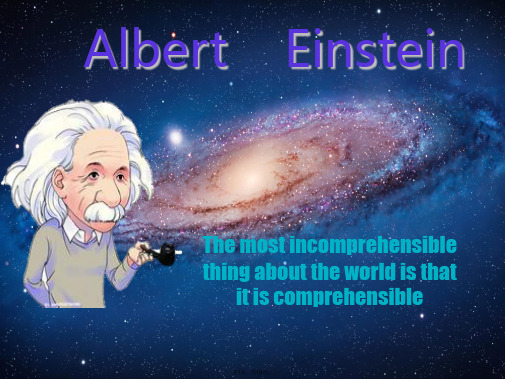
began 态度上的弱点会变成性格上的弱点。 to explore the secret of nature.
第4页,共10页。
A wise teacher
At sixteen Einstein applied for ETH(瑞士苏黎世的联邦 工业大学), but the entrance examination ended with failure. Mr. Weber read his papers of mathematics and physics and praised him: “You are a very intelligent child, Einstein, a very smart child, but
you have a big drawback(缺点) that you do not
want to express yourself."
第5页,共10页。
• Einstein is a sentimental(多情 的) person . During his life, he married twice and he had some mistress.(情人)
longer
than
other
children.
At
Special relativity
that time, his parents felt their son
may be stupid, but it turned out that he had
such a great success.
第3页,共10页。
scientist of the 20th century. He won a Nobel Prize of physic in 1921.
名人阿尔伯特·爱因斯坦人物介绍简短
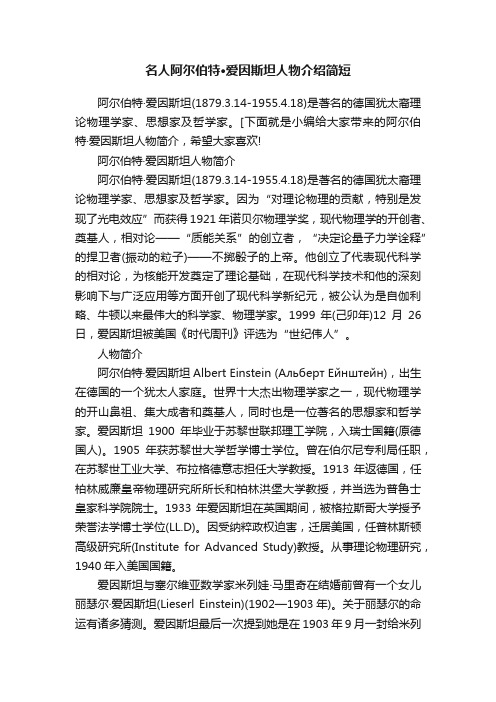
名人阿尔伯特·爱因斯坦人物介绍简短阿尔伯特·爱因斯坦(1879.3.14-1955.4.18)是著名的德国犹太裔理论物理学家、思想家及哲学家。
[下面就是小编给大家带来的阿尔伯特·爱因斯坦人物简介,希望大家喜欢!阿尔伯特·爱因斯坦人物简介阿尔伯特·爱因斯坦(1879.3.14-1955.4.18)是著名的德国犹太裔理论物理学家、思想家及哲学家。
因为“对理论物理的贡献,特别是发现了光电效应”而获得1921年诺贝尔物理学奖,现代物理学的开创者、奠基人,相对论——“质能关系”的创立者,“决定论量子力学诠释”的捍卫者(振动的粒子)——不掷骰子的上帝。
他创立了代表现代科学的相对论,为核能开发奠定了理论基础,在现代科学技术和他的深刻影响下与广泛应用等方面开创了现代科学新纪元,被公认为是自伽利略、牛顿以来最伟大的科学家、物理学家。
1999年(己卯年)12月26日,爱因斯坦被美国《时代周刊》评选为“世纪伟人”。
人物简介阿尔伯特·爱因斯坦Albert Einstei n (Альберт Ейнштейн),出生在德国的一个犹太人家庭。
世界十大杰出物理学家之一,现代物理学的开山鼻祖、集大成者和奠基人,同时也是一位著名的思想家和哲学家。
爱因斯坦1900年毕业于苏黎世联邦理工学院,入瑞士国籍(原德国人)。
1905年获苏黎世大学哲学博士学位。
曾在伯尔尼专利局任职,在苏黎世工业大学、布拉格德意志担任大学教授。
1913年返德国,任柏林威廉皇帝物理研究所所长和柏林洪堡大学教授,并当选为普鲁士皇家科学院院士。
1933年爱因斯坦在英国期间,被格拉斯哥大学授予荣誉法学博士学位(LL.D)。
因受纳粹政权迫害,迁居美国,任普林斯顿高级研究所(Institute for Advanced Study)教授。
从事理论物理研究,1940年入美国国籍。
爱因斯坦与塞尔维亚数学家米列娃·马里奇在结婚前曾有一个女儿丽瑟尔·爱因斯坦(Lieserl Einstein)(1902—1903年)。
美国100位历史名人榜(32):艾伯特·爱因斯坦
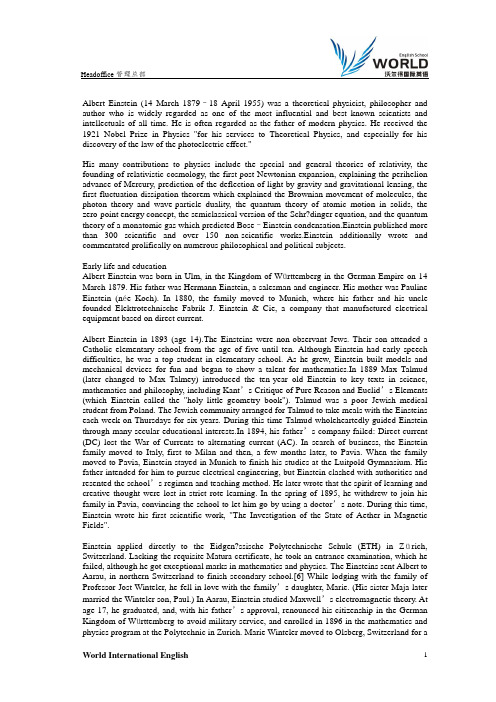
Headoffice管理总部Albert Einstein (14 March 1879–18 April 1955) was a theoretical physicist, philosopher and author who is widely regarded as one of the most influential and best known scientists and intellectuals of all time. He is often regarded as the father of modern physics. He received the 1921 Nobel Prize in Physics "for his services to Theoretical Physics, and especially for his discovery of the law of the photoelectric effect."His many contributions to physics include the special and general theories of relativity, the founding of relativistic cosmology, the first post-Newtonian expansion, explaining the perihelion advance of Mercury, prediction of the deflection of light by gravity and gravitational lensing, the first fluctuation dissipation theorem which explained the Brownian movement of molecules, the photon theory and wave-particle duality, the quantum theory of atomic motion in solids, the zero-point energy concept, the semiclassical version of the Schr?dinger equation, and the quantum theory of a monatomic gas which predicted Bose–Einstein condensation.Einstein published more than 300 scientific and over 150 non-scientific works.Einstein additionally wrote and commentated prolifically on numerous philosophical and political subjects.Early life and educationAlbert Einstein was born in Ulm, in the Kingdom of Württemberg in the German Empire on 14 March 1879. His father was Hermann Einstein, a salesman and engineer. His mother was Pauline Einstein (née Koch). In 1880, the family moved to Munich, where his father and his uncle founded Elektrotechnische Fabrik J. Einstein & Cie, a company that manufactured electrical equipment based on direct current.Albert Einstein in 1893 (age 14).The Einsteins were non-observant Jews. Their son attended a Catholic elementary school from the age of five until ten. Although Einstein had early speech difficulties, he was a top student in elementary school. As he grew, Einstein built models and mechanical devices for fun and began to show a talent for mathematics.In 1889 Max Talmud (later changed to Max Talmey) introduced the ten-year old Einstein to key texts in science, mathematics and philosophy, including Kant’s Critique of Pure Reason and Euclid’s Elements (which Einstein called the "holy little geometry book"). Talmud was a poor Jewish medical student from Poland. The Jewish community arranged for Talmud to take meals with the Einsteins each week on Thursdays for six years. During this time Talmud wholeheartedly guided Einstein through many secular educational interests.In 1894, his father’s company failed: Direct current (DC) lost the War of Currents to alternating current (AC). In search of business, the Einstein family moved to Italy, first to Milan and then, a few months later, to Pavia. When the family moved to Pavia, Einstein stayed in Munich to finish his studies at the Luitpold Gymnasium. His father intended for him to pursue electrical engineering, but Einstein clashed with authorities and resented the school’s regimen and teaching method. He later wrote that the spirit of learning and creative thought were lost in strict rote learning. In the spring of 1895, he withdrew to join his family in Pavia, convincing the school to let him go by using a doctor’s note. During this time, Einstein wrote his first scientific work, "The Investigation of the State of Aether in Magnetic Fields".Einstein applied directly to the Eidgen?ssische Polytechnische Schule (ETH) in Zürich, Switzerland. Lacking the requisite Matura certificate, he took an entrance examination, which he failed, although he got exceptional marks in mathematics and physics. The Einsteins sent Albert to Aarau, in northern Switzerland to finish secondary school.[6] While lodging with the family of Professor Jost Winteler, he fell in love with the family’s daughter, Marie. (His sister Maja later married the Winteler son, Paul.) In Aarau, Einstein studied Maxwell’s electromagnetic theory. At age 17, he graduated, and, with his father’s approval, renounced his citizenship in the German Kingdom of Württemberg to avoid military service, and enrolled in 1896 in the mathematics and physics program at the Polytechnic in Zurich. Marie Winteler moved to Olsberg, Switzerland for aHeadoffice管理总部teaching post.Academic careerIn 1901, Einstein had a paper on the capillary forces of a straw published in the prestigious Annalen der Physik.In 1905, he received his doctorate from the University of Zurich. His thesis was titled "On a new determination of molecular dimensions". That same year, which has been called Einstein's annus mirabilis or "miracle year", he published four groundbreaking papers, on the photoelectric effect, Brownian motion, special relativity, and the equivalence of matter and energy, which were to bring him to the notice of the academic world.By 1908, he was recognized as a leading scientist, and he was appointed lecturer at the University of Berne. The following year, he quit the patent office and the lectureship to take the position of physics professor at the University of Zurich. He became a full professor at Karl-Ferdinand University in Prague in 1911. In 1914, he returned to Germany after being appointed director of the Kaiser Wilhelm Institute for Physics and professor at the University of Berlin.In 1911, he had calculated that, based on his new theory of general relativity, light from another star would be bent by the Sun's gravity. That prediction was claimed confirmed by observations made by a British expedition led by Sir Arthur Eddington during the solar eclipse of May 29, 1919. International media reports of this made Einstein world famous. (Much later, questions were raised whether the measurements were accurate enough to support such a claim.)In 1921, Einstein was awarded the Nobel Prize in Physics. Because relativity was still considered somewhat controversial, it was officially bestowed for his explanation of the photoelectric effect. He also received the Copley Medal from the Royal Society in 1925.DeathOn 17 April 1955, Albert Einstein experienced internal bleeding caused by the rupture of an abdominal aortic aneurysm, which had previously been reinforced surgically by Dr. Rudolph Nissen in 1948.He took the draft of a speech he was preparing for a television appearance commemorating the State of Israel’s seventh anniversary with him to the hospital, but he did not live long enough to complete it. Einstein refused surgery, saying: "I want to go when I want. It is tasteless to prolong life artificially. I have done my share, it is time to go. I will do it elegantly." He died in Princeton Hospital early the next morning at the age of 76, having continued to work until near the end. Einstein’s remains were cremated and his ashes were scattered around the grounds of the Institute for Advanced Study, Princeton, New Jersey. During the autopsy, the pathologist of Princeton Hospital, Thomas Stoltz Harvey removed Einstein’s brain for preservation, without the permission of his family, in hope that the neuroscience of the future would be able to discover what made Einstein so intelligent.Scientific careerThroughout his life, Einstein published hundreds of books and articles. Most were about physics, but a few expressed leftist political opinions about pacifism, socialism, and zionism. In addition to the work he did by himself he also collaborated with other scientists on additional projects including the Bose–Einstein statistics, the Einstein refrigerator and others.。
有关励志的英文版名人故事
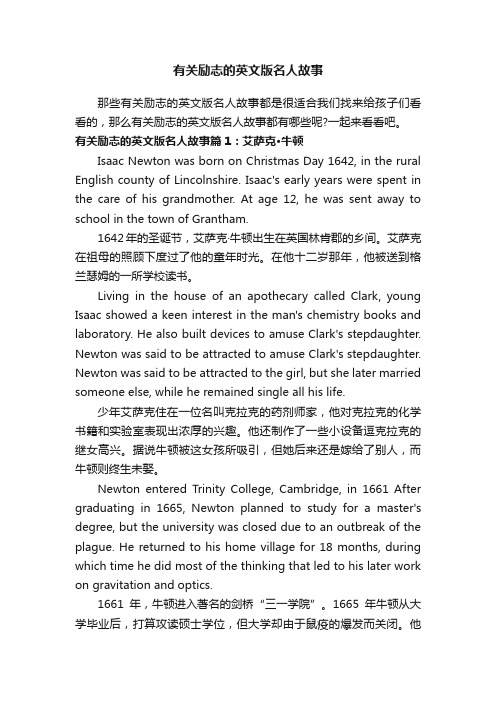
有关励志的英文版名人故事那些有关励志的英文版名人故事都是很适合我们找来给孩子们看看的,那么有关励志的英文版名人故事都有哪些呢?一起来看看吧。
有关励志的英文版名人故事篇1:艾萨克·牛顿Isaac Newton was born on Christmas Day 1642, in the rural English county of Lincolnshire. Isaac's early years were spent in the care of his grandmother. At age 12, he was sent away to school in the town of Grantham.1642年的圣诞节,艾萨克·牛顿出生在英国林肯郡的乡间。
艾萨克在祖母的照顾下度过了他的童年时光。
在他十二岁那年,他被送到格兰瑟姆的一所学校读书。
Living in the house of an apothecary called Clark, young Isaac showed a keen interest in the man's chemistry books and laboratory. He also built devices to amuse Clark's stepdaughter. Newton was said to be attracted to amuse Clark's stepdaughter. Newton was said to be attracted to the girl, but she later married someone else, while he remained single all his life.少年艾萨克住在一位名叫克拉克的药剂师家,他对克拉克的化学书籍和实验室表现出浓厚的兴趣。
爱因斯坦英文简介
————第五小组
Einstein&#手放在滚热的炉子上一分钟,感觉起来像一小时。 坐在一个漂亮姑娘身边整整一小时,感觉起来像一分钟。 这就是相对论。 • 原文:Put your hand on a hot stove for a minute, and it seems like an hour. Sit with a pretty girl for an hour, and it seems like a minute. That's relativity.
an unwelcome Student 一个不受欢迎 的学生
An incredible Scientists 一个不可思议 的科学家
A humorous man 一个不无趣味 的老人 a Social activist who is careless about his dress 一个不修边幅 的社会活动家
Obsessed Smoker
When Einstein died in 1955, his body was cremated and his ashes scattered, as was his wish. However, before his body was cremated, pathologist Thomas Harvey at Princeton Hospital conducted an autopsy in which he removed Einstein's brain. Rather than putting the brain back in the body, Harvey decided to keep it, ostensibly for study. Harvey did not have permission to keep Einstein's brain, but days later, he convinced Einstein's son that it would help science. Shortly thereafter, Harvey was fired from his position at Princeton because he refused to give up Einstein's brain. For the next four decades, Harvey kept Einstein's chopped-up brain (Harvey had it cut into over 200 pieces) in two mason jars with him as he moved around the country. Every once in a while, Harvey would slice off a piece and send it to a researcher. Finally, in 1998, Harvey returned Einstein's brain to the pathologist at Princeton Hospital.
爱因斯坦英文简介(配中文)
爱因斯坦英文简介(配中文)
阿尔伯特·爱因斯坦(Albert Einstein)是一位著名的物理学家,他的相对论对现代物理学产生了深远的影响。
以下是一个简短的爱因斯坦英文简介,并配有中文翻译:
Albert Einstein was a German-born physicist who developed the theory of relativity and made numerous other significant contributions to physics. His work revolutionized our understanding of space, time, and gravity, and had a profound impact on the development of modern science and technology.Einstein is widely regarded as one of the greatest physicists of all time, and his name is synonymous with intellectual brilliance and scientific innovation.
阿尔伯特·爱因斯坦是一位出生于德国的物理学家,他发展了相对论,并对物理学做出了许多其他重要贡献。
他的工作彻底改变了我们对空间、时间和引力的理解,对现代科学技术的发展产生了深远的影响。
爱因斯坦被广泛认为是有史以来最伟大的物理学家之一,他的名字成为了智慧和科学创新的代名词。
美国历史上的名人的英文简介(AnAmericanhistoryoffamouspeople)
美国历史上的名人的英文简介(An American history of famouspeople)本杰明? 富兰克林 (1706 - benjamin franklin, 1790)franklin is the founding father who is seen as the master of home spun (朴素的) practical wisdom. of humble origins, he began as a printer and writer (the author of poor richard's almanack), then became an inventor and scientist, and concluded his long career as the consummate diplomat, 完美的). he played a key behind the scenes role at the conventions that led to the declaration of independence and the u.s. constitution.富兰克林是美国开国元勋, 被誉为朴素、务实的智慧大师.他出身贫寒, 最初从事印刷和写作 (《穷人理查德年鉴》一书的作者), 后成为发明家和科学家, 最后作为杰出的外交家结束了漫长的职业生涯.他从幕后为各种重要会议发挥了关键作用, 最后导致《独立宣言》和《美国宪法》的诞生.george washington (1732 - 99).the first president of the united states and the american commander in chief during the war of independence from great britain, washington is often called the "father of his country". originally a gentleman farmer in virginia, washington showed great leadership qualities as a soldier. highly popular with the american public, he was eulogized by a member of congress as "first in war, first in peace, and first in the hearts of his countrymen."乔治? 华盛顿 (george washington, 1732 - 1799)华盛顿是美国第一任总统, 在摆脱英国统治的独立战争 (war of independence) 时期担任总司令, 常被尊称为 "国父".他原是弗吉尼亚州 (virginia) 一位从事农业的乡绅, 后成为一名军人, 表现出非凡的领导能力.他在美国公众中享有崇高的声望, 一位国会议员曾赞颂他是 "英勇作战第一人, 争取和平第一人、國人心中第一人.thomas jefferson (1743 - 1826)jefferson was the primary author of the declaration of independence in 1776. we hold these truths to be self evident, "he wrote," that all men are created equal, that they are endowed by their creator with certain unalienable rights, that among these are life, liberty, and the pursuit of happiness. "jefferson, who was later elected the third president of the united states, also wrote the state of virginia's law establishing religious freedom and founded the university of virginia. 托马斯? 杰佛逊 (thomas jefferson, 1743 - 1826)杰佛逊是1776年《独立宣言》主要起草人.他写道 "我们认为下面这些真理是不言而喻的: 人人生而平等, 造物者赋予他们若干不可剥夺的权利, 其中包括生命权、自由权和追求幸福的权利. 杰佛逊后来当选美国第三任总统.他还起草了弗吉尼亚州保障宗教自由的法律, 并创办了弗吉尼亚大学 (university of virginia).sacagawea (ca. 1786 - 1812)a young woman of the lemhi indians in present-day idaho, sacagawea helped the lewis and clark expedition in 1804 06 exploring vast newly acquired lands in the american west. sacagawea, who spoke several indian dialects, served as a guideand interpreter to various native american tribes during this peaceful movement. when the expedition encountered the lemhi band, she arranged for the lemhi to provide the horses, food, and shelter that made the journey to the pacific ocean. one of sacagawea''s descendants.Willow Jack,如真正的服装。
爱因斯坦英文介绍PPT课件
.
3
Curiosity and Science
• Undoubtedly, as all scientists do, Einstein has amazing wisdom(智慧) and great curiosity over nature. At the age of five, when he was ill, his father sent him a compass. He discovered that in any case the pointer will point toward the same direction, so he began to explore the secret of nature.
Character.
.
8
.Leabharlann 9THE ENDThank you for viewing!
.
10
in school.
3. 一个人从未犯错是因为他不曾尝试新鲜事物。 Anyone who has never made a mistake has never tried
anything new.
4. 态度上的弱点会变成性格上的弱点。 Weakness of attitude becomes weakness of
I. 广义相对论
II. 狭义相对论
III. 布朗运动
IV. 光电效应
V. Energy is equal to mass multiplied by the square of the speed of light
VI. 爱因斯坦场方程
VII. 玻色-爱因斯坦统计
.
7
Einstein's famous sayings
- 1、下载文档前请自行甄别文档内容的完整性,平台不提供额外的编辑、内容补充、找答案等附加服务。
- 2、"仅部分预览"的文档,不可在线预览部分如存在完整性等问题,可反馈申请退款(可完整预览的文档不适用该条件!)。
- 3、如文档侵犯您的权益,请联系客服反馈,我们会尽快为您处理(人工客服工作时间:9:00-18:30)。
It is a spiritual(精神的; 心灵的 ) love that is named after the western philosopher Platon . The pursuit(追求) is spiritual communication that without lust(肉欲 ). And the love is clean
Standing beside your lover, quietly pay, silently waiting. Don‘t expect the approach (走近),do not have a dream to own;even know that there are no results, still do not regret(后悔)love.
Albert Einstein Plato
Einstein’s eyes once again onto the old and new China, in the winter of 1922, he was invited to Japan study, trip, two times after Shanghai, all for three days, saw in the suffering of China, and expressed(表达) deep sympathy (同情).
TpaMPhlhlsaaieolotiongsonroneapedachtooheGfcrie(ttrhrevien哲eeekwm学(e(柏es家希tne拉)腊trsn.图的Hcue)主ltius义re)‘s
gPrleaatot nphliolovseo(ph柏er拉s a图nd式th爱in情ker)s
and affected the whole western philosophy(哲学). His teacher Socrates(苏格拉底),his student Aristotle(亚里士多德), and himself were known as the
three great ancient Greek
4 in the world has one and only one of you, and said, she ( he ) is perfect, and only for you perfect. That is to say, any one person, has its perfect lover, but the only one.
Perhaps this kind of love that is not asking for anything decides a tragic (悲剧的)ending. In the end, it can only be two parallel (平行的) lines in the distance waiting, but leave the most beautiful feel of love as the memory!
and pure.
Plato love has the following meanings: 1 Concept(观念)of the ideal type of love 2 pure spiritual rather than physical love 3 the equality between men and women love
He thought, this is the nation (民族)which is the poorest, they were cruelly abused(虐 待), they were treated better than beasts of burden(力畜; 役畜 ). 他们所受的待遇比牛马还不如
AtThfheteePr rstiencncieeynteoatnirssUt(sn1i9vw3eh6rs)o,itEywinionsrttekhieendat UwSitAhaEndintshteefionrmaedrmyeiraerdleharinming Zvheoryu Pmeuiycuhan. ‘s first interview wThheenahweasradid:w“htihcehCEhiinnessteein pc(rweoea真cmospe挚plitaevh的seaes)rdieoN,nsho(uebfaf同eerrtl情fineP)lgtr(ipzise发eos.自pinle内c.e”心rHe is 的 Th)e, enqotutaatlkio, bnutthaacttioEni.nstein worked out is E=mc^2.
